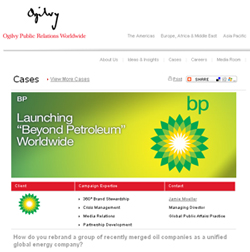In 2000, BP hired one of the world's most esteemed PR firm, Ogilvy & Mather, to create a global brand transformation. The slogan, "Beyond Petroleum" was created to show that BP transcended the oil sector by being innovative, progressive and environmentally responsible.
The company abandoned its 70-year old shield-style logo to a new cheerful, green sunburst. To many, the new image and message was a huge contradiction since BP's investment in renewable energy paled in comparison to what BP spent in extractive oil. So in a sense, many people felt that BP had changed its image but not its stance in being more environmentally friendly.
Social responsibility is an ethical ideology that both organizations and individuals should embrace and incorporate.
For example in my household, I am doing my best to conserve energy, water, to take public transportation when possible (I just signed up for a year-contract with Zip Car), and to even ride my bike to school.
BP's focus on social responsibility was a brilliant strategy ushered by a very shrewd PR firm. Many would agree that it was honorable and definitely fashionable for BP to accept global warming as a reality, while competitors like Exxon Mobil completely ignored this trend.
However, while BP was polishing their philanthropic image, they were neglecting a very basic principal that would impact not just their image but their bottom line.
If BP had just reallocated some of their funds that they frittered away on marketing towards safety, security and the implementation of back ups, then perhaps their corporate social image would be a lot rosier today that it was after the historic oil spill and beyond our immediate future.
Was BP guilty of greenwashing? Obviously history shows that BP's rebranding was deceptive. Perhaps their motives for being environmentally sensitive was genuine and despite the fact that Deepwater Horizon explosion was an accident, if BP was truly environmentally conscious, they wouldn't have skimped on proper testing, back-up measures and inspections.
BP's advertisement budget during the spill neared 100 million. Their goal was to inform Gulf coast residents and the rest of the US about the progress of the recovery effort. By now, BP's disingenuous advertisement that they are developing low-carbon, renewable energy sources will fall on deaf's ears.
The company abandoned its 70-year old shield-style logo to a new cheerful, green sunburst. To many, the new image and message was a huge contradiction since BP's investment in renewable energy paled in comparison to what BP spent in extractive oil. So in a sense, many people felt that BP had changed its image but not its stance in being more environmentally friendly.
Social responsibility is an ethical ideology that both organizations and individuals should embrace and incorporate.
For example in my household, I am doing my best to conserve energy, water, to take public transportation when possible (I just signed up for a year-contract with Zip Car), and to even ride my bike to school.
BP's focus on social responsibility was a brilliant strategy ushered by a very shrewd PR firm. Many would agree that it was honorable and definitely fashionable for BP to accept global warming as a reality, while competitors like Exxon Mobil completely ignored this trend.
Deep Horizon was not the first incident
In 2005, a major explosion destroyed a gasoline-filled tower at BP's Texas City refinery. Investigations showed that BP had ignored its own safety protocol. In 2006, BP also experienced a 4,800 barrel oil spill in Alaska. Despite its history of accidents and environmental disasters, BP is still trying to tout its environmental image.
However, while BP was polishing their philanthropic image, they were neglecting a very basic principal that would impact not just their image but their bottom line.
If BP had just reallocated some of their funds that they frittered away on marketing towards safety, security and the implementation of back ups, then perhaps their corporate social image would be a lot rosier today that it was after the historic oil spill and beyond our immediate future.
Was BP guilty of greenwashing? Obviously history shows that BP's rebranding was deceptive. Perhaps their motives for being environmentally sensitive was genuine and despite the fact that Deepwater Horizon explosion was an accident, if BP was truly environmentally conscious, they wouldn't have skimped on proper testing, back-up measures and inspections.
BP's advertisement budget during the spill neared 100 million. Their goal was to inform Gulf coast residents and the rest of the US about the progress of the recovery effort. By now, BP's disingenuous advertisement that they are developing low-carbon, renewable energy sources will fall on deaf's ears.




No comments:
Post a Comment